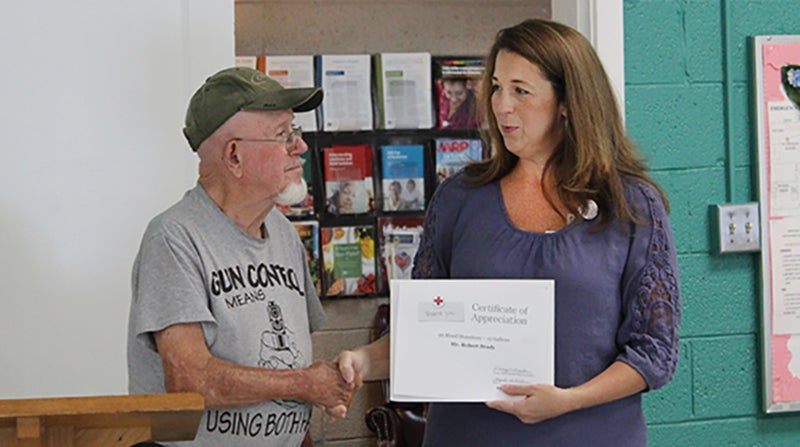Pint Power
Published 5:43 pm Friday, August 12, 2022

- Stuart Brady was honored earlier this week by the American Red Cross upon reaching the 14-gallon mark in donating blood. Red Cross Regional Manager Toni Meeks is shown presenting Brady with a certificate. Brady will also receive a pin in recognition of his accomplishment. Staff Photo by Holly Taylor
|
Getting your Trinity Audio player ready...
|
WINTON – A blood donation can save up to three lives.
Local seniors learned this fact and others about blood donations when they gathered at the Hertford County Office of Aging (HCOA) in Winton on Aug. 10 for a presentation on the topic. They also were able to recognize one of their own who recently reached a milestone in donations.
Stuart Brady was presented with a certificate and pin recognizing his accomplishment of donating 14 gallons of blood throughout his life so far.
“We want to recognize you today and thank you for all the blood that you have given over the years,” said Jo Anne Powell, Program Manager at HCOA, as she recognized Brady for reaching the significant milestone.
Toni Meeks, who serves as a regional manager with the American Red Cross, said she often sees Brady at blood drives in Ahoskie, which are usually held at the American Legion building or St. Thomas Episcopal Church.
Powell noted that Brady often chooses to give “doubles” at the blood drives. That’s another term for a “Power Red” donation where the donor gives up two pints of red blood cells while the rest of the blood components are safely returned to the donor.
She also said that Brady always arrives ready and prepared. He’s always dressed warmly, for example.
Brady explained to the others in attendance that you can get pretty cold while donating, especially when it’s a Power Red.
“A lot of times, we think when we get older, we can’t donate,” Meeks added. “But this man is a testament that even when we approach our senior years, we can still continue to donate blood and save lives.”
Following Brady’s recognition, Meeks gave a presentation to the group about important things to know about donating blood.
Meeks explained that she got her start with Red Cross by accompanying her mother to blood drives in Ahoskie.
“She always taught me, no matter how little we have, we can always save a life by donating blood,” Meeks said.
When her mother was medically unable to continue donating, Meeks stepped up to do it in her honor. After she passed away, Meeks continued to donate in her memory.
Blood donations are able to help people a wide range of medical needs, and the odds of knowing at least one person who’s received a blood transfusion are high. Those recipients can include people who’ve suffered a traumatic injury, women who have just given birth, cancer patients, and people who have sickle cell anemia.
Meeks added that September is sickle cell awareness month. It’s a blood disorder, which mostly affects minorities, where blood cells are shaped differently than normal. That causes clotting and pain, and people with sickle cell anemia need frequent blood transfusions as treatment.
For people interested in donating, Meeks explained that the process is easy.
“If you can handle a pinch, you can handle giving blood,” she said.
Appointments at local blood drives are recommended, but walk-ins are usually able to donate as well. A donor will have to register, and then do a quick health physical beforehand.
“It’s just to make sure you’re well that day. That’s good for you and the person who’s going to receive your blood,” Meeks admitted. “They check your pulse, your blood pressure. They want to make sure your iron is up high. And, overall, you’re feeling well and you can donate.”
Some of the attendees said they’ve been deferred before for low iron. Meeks recommended eating foods like red meat or greens ahead of time to help with that problem.
She also recommended donors to get a good night’s sleep beforehand and to eat a healthy lunch.
“You don’t want to go in and lose a pint of blood on an empty stomach,” she added.
The group asked various questions, such as if there’s an age limit or if diabetics were able to donate. Meeks answered that there is no age limit, though there are some minimum height and weight restrictions. She also said that they have had diabetic donors before. People on certain medications, however, such as anti-coagulants may be deferred.
For those who are unable to give blood, volunteering with Red Cross is an option instead. Meeks said they’re always looking for people to help with registration or running the canteen.
In addition to her presentation, Meeks also distributed informational pamphlets to the group.
The American Red Cross is always in need of donations from all blood types. The organization estimates that they need to collect about 12,500 blood donations and 2,700 platelet donates each day to help those in need across the United States.
For more information, visit their website www.redcross.org

